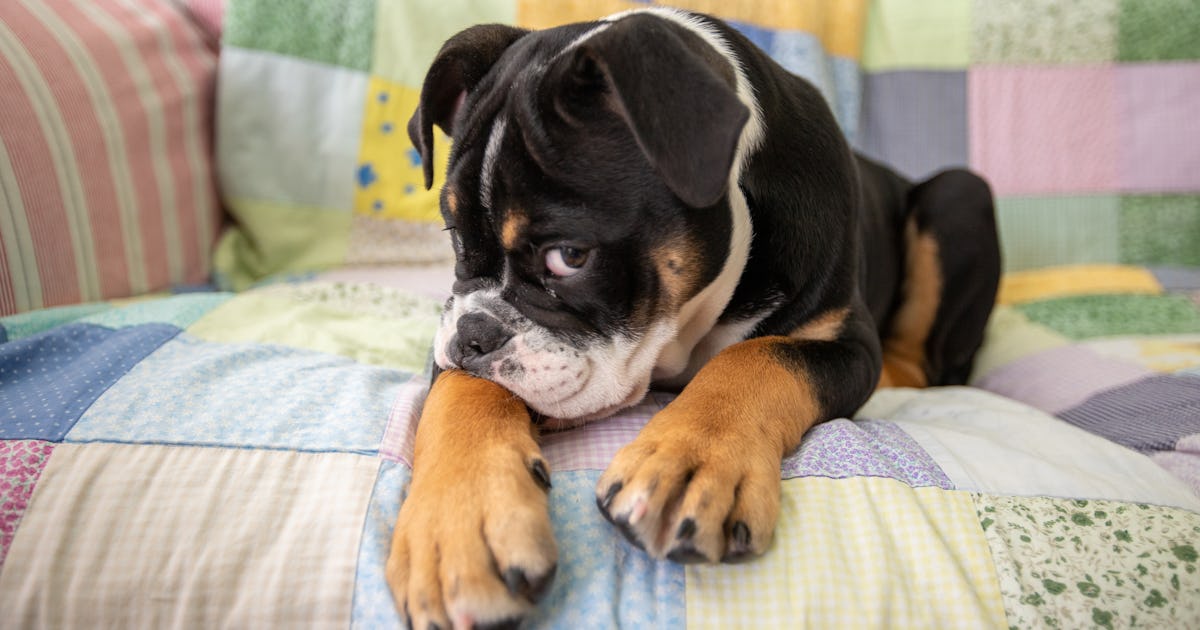What is it about the smell of a dog fart that makes it feel like your nose is going to turn inside out? My dog, Zelda, is a beautiful, patient, loving creature, but she is known around our house as the ass-ripper extraordinaire for her ability to clear a room with a single toot. If you have a pup, chances are you know the feeling, and that the worst of their flatulence seems to happen in their sleep. If your dog farts while sleeping a lot, just know that it’s totally normal (not to make it weird, but humans do this too, for reference).
So, what gives with dogs letting ’em rip while napping and overnight, snuggled next to you in bed?
Why does my dog fart during sleep?
Simply put: because they’re chilling hard. “It is normal for dogs to pass gas while sleeping since their muscles are at their most relaxed,” says Dr. Carly Fox, senior veterinarian in the emergency and critical care unit at the Schwarzman Animal Medical Center. You might notice an especially large number of toots from your pup if they’re one of the brachycephalic breeds — those with short snouts and flat faces — like bulldogs and pugs. This is because they tend to swallow more air when breathing than their longer-snouted compatriots.
And why do dog farts smell so bad anyway, you ask? “Dog farts can be particularly odorous due to a combination of their diet, gut flora, and digestive efficiency,” says Fox. “Some dogs have underlying gastrointestinal disease that can contribute to worse odor. Also, depending on their diet — like if it’s high in protein or made with low-quality ingredients — the smell of their flatulence can vary.”
When should I be concerned about my dog’s farts?
If your dog’s flatulence is accompanied by diarrhea, vomiting, a distended abdomen, loss of appetite, weight loss, or fecal incontinence, you should see your veterinarian, Fox says. You know what a normal amount of flatulence is for your dog too. If they surpass their normal and are excessively farting, that should also be a red flag to you.
Your vet will want to check them out and ensure there’s no underlying gastrointestinal disease, and Fox encourages pet parents to make an appointment as soon as they notice any of these signs of GI distress. The doctor will likely do a physical exam and some diagnostic testing, like bloodwork, fecal testing, and maybe an ultrasound of your pup’s abdomen.
Of course, if nothing is amiss and you just want to make sure you’re taking good care of your dog’s stomach, your vet can help with that too. “You can be proactive about your dog’s gut health by feeding them a high-quality diet, keeping them trim, taking them to the vet for routine care, and also starting a probiotic to add into their food,” Fox says. There are lots of canine probiotics available online without a prescription, but you could ask your vet what brand they find most effective. Fox recommends Visbiome most often, but it does require a prescription.
So, as long as your dog is only ripping the amount of farts you’ve come to expect from them, then there’s no need to worry. And who knows, maybe a little added probiotic or a different kind of food will help soothe their bellies even more. Just know your vet is happy to help.

